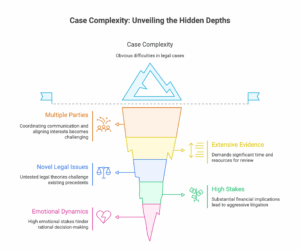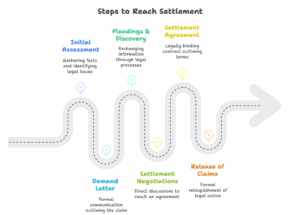Settling a legal dispute can feel like navigating a maze. The process, often involving nuanced legal arguments and emotional stakes, can be further complicated by the specific details of each case. Let’s break down the settlement process, examine what makes some cases more complex than others, and explore how these complexities impact the time it takes to resolve.
Understanding the Settlement Process: An Overview
The settlement process is essentially a negotiation between parties to resolve a dispute outside of a courtroom trial. It often begins with an informal exchange of information, followed by attempts to reach an agreement through direct communication, mediation, or arbitration. The goal? To find a mutually acceptable solution that avoids the expense, time, and uncertainty of a trial.
Factors Influencing Case Complexity in Settlements
Several factors can significantly increase the complexity of a case. These “complexity drivers” often intertwine, making each situation unique:
-
Multiple Parties: A case involving several plaintiffs or defendants naturally increases complexity. Coordinating communication, aligning interests, and resolving conflicting claims become challenging. Imagine a construction defect case involving the developer, general contractor, multiple subcontractors, and numerous homeowners – the potential for disagreement is substantial.
-
Extensive Evidence: Cases with mountains of documents, electronic data, or expert testimony demand significant time and resources for review and analysis. For instance, environmental contamination lawsuits often involve complex scientific data, lengthy regulatory records, and competing expert opinions on causation and damages.
-
Novel Legal Issues: If a case involves untested legal theories or challenges existing precedents, expect a more protracted settlement process. Intellectual property disputes, especially those involving cutting-edge technology, often raise novel questions that require careful legal analysis.
-
High Stakes: Cases with substantial financial implications or significant reputational risk often lead to more aggressive litigation and protracted settlement negotiations. Corporate litigation involving potential multi-million dollar payouts is a prime example.
-
Emotional Dynamics: Personal injury or family law cases often have high emotional stakes, which can hinder rational decision-making and complicate settlement discussions.

Navigating the Settlement Process Timeline: Key Milestones
While every case is unique, the settlement process generally follows these key milestones:
- Initial Assessment & Investigation: Gathering facts, identifying legal issues, and assessing potential liability.
- Demand Letter (Optional): A formal communication outlining the claim and desired settlement amount.
- Pleadings & Discovery: Exchanging information through interrogatories, document requests, and depositions. This stage is crucial and can be time-consuming.
- Settlement Negotiations: Direct discussions, mediation, or arbitration to reach an agreement.
- Settlement Agreement: A legally binding contract outlining the terms of the settlement.
- Release of Claims: Formal relinquishment of the right to pursue further legal action.

How Case Complexity Affects the Settlement Timeline
Case complexity directly impacts the settlement timeline. Complex cases invariably take longer to resolve due to the increased time needed for:
- Discovery: Reviewing voluminous documents and deposing multiple witnesses can extend the discovery phase by months, even years. A recent study by the Institute for the Advancement of the American Legal System (IAALS) found that complex civil cases take, on average, twice as long to resolve as simpler cases.
- Expert Analysis: Retaining, consulting with, and deposing experts on complex technical or scientific matters significantly adds to the process time.
- Negotiations: Reaching a consensus among multiple parties or on novel legal issues can be a lengthy and challenging process.
For example, a simple car accident case might settle within a few months. But a complex medical malpractice case with multiple defendants, intricate medical records, and conflicting expert opinions could easily take a year or more to resolve.
Expert Strategies for Managing Complex Settlements
Several strategies can help manage complex settlements more effectively:
- Early Case Assessment: Conduct a thorough assessment of the case’s complexities early on to develop a realistic settlement strategy.
- Strategic Discovery Planning: Focus discovery efforts on the most critical issues to avoid getting bogged down in irrelevant details. Consider a phased approach, addressing key issues before moving to less critical areas.
- Alternative Dispute Resolution (ADR): Mediation and arbitration offer structured frameworks for resolving disputes outside of the court system. Mediation, in particular, is often beneficial for complex cases as it allows a neutral third party to facilitate communication and explore creative solutions. Arbitration provides a more formal and binding process.
- Collaboration and Communication: Foster open communication and cooperation between all parties to streamline information sharing and facilitate consensus-building.
- Technology: Utilise technology to manage large volumes of documents, track deadlines, and facilitate communication among parties. Case management software and e-discovery tools can significantly improve efficiency.
Common Roadblocks and Delays in the Settlement Process
Even with careful planning, roadblocks can arise:
- Discovery Disputes: Disagreements over the scope or timing of discovery can lead to motion practice and delays.
- Unrealistic Expectations: Unrealistic settlement demands from either party can stall negotiations.
- Emotional Obstacles: Strong emotions can hinder rational decision-making and complicate settlement discussions.
- Changes in Circumstances: New information or changes in a party’s financial situation can impact the settlement process.
Optimising Your Settlement Outcome: Expert Advice and Future Trends
To optimise your settlement outcome:
- Seek Experienced Counsel: An attorney with experience in handling complex cases can provide invaluable guidance and advocacy.
- Be Prepared to Compromise: Settlement requires give-and-take. Be willing to compromise to resolve.
- Understand Your Goals: Clearly define your settlement goals and priorities.
Looking ahead, we can expect to see increasing reliance on technology in managing complex case information and accelerating settlement. AI-powered tools for document review and predictive analytics for assessing settlement value are already emerging, offering the potential to streamline the process and improve outcomes. Jurisdictional differences, such as varying rules of evidence and judicial philosophies, also impact the complexity and timelines, necessitating that attorneys be well-versed in the specific legal landscape of each jurisdiction.




